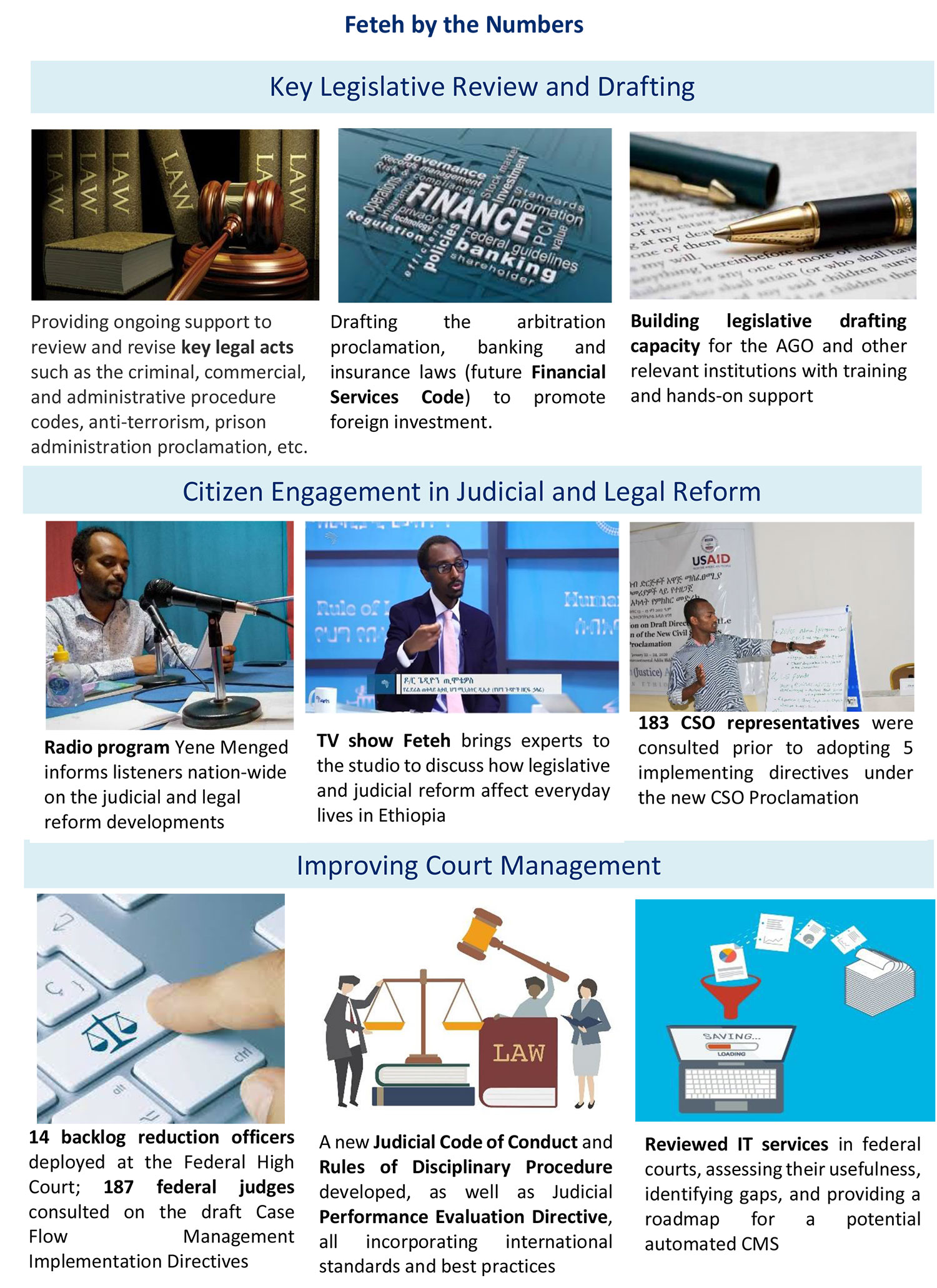
The Millennium/DPI joint venture (MDPI) is implementing USAID’s Feteh (‘justice’, in Amharic) Activity in Ethiopia. It is a 4.5-year project designed to support the strengthening of the rule of law in Ethiopia by providing flexible, rapid response technical assistance to select judicial institutions, other constitutionally mandated democratic and human rights institutions, and legal and academic institutions.
Through Feteh, MDPI is providing tailor-made technical assistance to the Attorney General’s Office (AGO), relevant legal drafting sub-committees within the AGO, the Federal Supreme Court of Ethiopia (FSCE), and related government entities. Project activities also include grants to civil society organizations and media to strengthen their ability to consult and engage the public in Ethiopia’s ongoing legal and judicial reform processes.
Feteh’s assistance to the courts includes developing an integrated case management information system (CMIS) for the federal judiciary to replace the current system. This activity, currently unfolding, has included evaluating existing systems and business processes, providing recommendations for their improvement, and developing technical specifications and functional requirements for the new CMIS. Future support will include system procurement, development, implementation, and related training.
Feteh is working with the FSCE to revise laws governing the judiciary, including public consultations on newly drafted laws. The project is also enhancing case flow management and launching a pilot backlog reduction and prevention program, strengthening commercial benches and updating civil and criminal bench books, and reviewing and updating the Judicial Code of Ethics and Rules of Disciplinary Procedure to strengthen judicial ethics and accountability. Further, the Project helped develop two judicial laws that provide a comprehensive framework for the administration of judicial affairs that ensures independence and accountability, and introduce changes in the jurisdiction of federal courts.
Feteh has provided training for both judges and prosecutors on the following topics: the new ethics code; handling corruption cases; substantive issues that judges have identified as critical for processing cases more efficienty; legal drafting and bench leadership.
Feteh worked with the AGO and its sub-committees on a substantive review of key draft laws and translated them to and from Amharic/English to facilitate expert review and public consultations. These include the Commercial Code, the Criminal Procedure Code, the Administrative Procedures Proclamation, and the Conciliation and Arbitration Proclamation, which has improved the legal environment for foreign investment. Technical assistance was provided also with the development of new commercial, banking, and insurance codes in preparation for the adoption of a future Financial Services Code, the first serious attempt by the GOE in many decades to modernize the legal framework governing this sector.
During the first year of project’s efforts, Feteh facilitated the adoption of the Anti-Terrorism Proclamation, and Prison Administration Proclamation, two key draft laws prepared by the AGO’s Advisory Council working groups. The new Prison Administration Proclamation brought critical attention to overlooked needs of women in the prison system in particular regarding the regular distribution of sanitary pads, accountability measures for officers to reduce sexual harassment, and the provision of maternal health services, among others. Feteh incorporates gender considerations into all reforms including research and data collection, the policy implications of new and amended laws, and networking and partnership opportunities.
Feteh is also strengthening clinical legal education and access to justice. It supported a nationwide assessment on the status of clinical legal education and the contribution of clinical legal aid centers to access to justice, and is supporting the legal aid clinic at Addis Ababa University to provide free legal services to women, persons with disabilities, and the poor.
In May 2021, Feteh officially opened its first regional office, located in Bahir Dar, to further support the legislative and judicial reform activities in the Amhara Regional State.
Through its subcontractors, Feteh’s mass media programs use television, radio, and the internet to actively increase the public’s legal awareness and improve public perception of recent legal and justice reforms. These methods effectively address the general lack of legal knowledge and misconceptions about legal reforms. Feteh is engaging audiences nation-wide through quality prime-time TV programs that spotlight justice and legal reform through short documentary dramas, forums, and town-hall meetings. Yenge Menged broadcasts in a format which breaks down complex legal issues into easily understandable segments. The broadcasts allows their 5-8 million listeners across the country to discuss and comment, giving their verdicts as if they were judges and/or jury. Feteh uses social media channels to amplify the reach of these initiatives, expanding the pool of participating voices and building strong engagement with the public.
